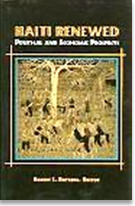 "Duvalier and the Catholic Church" by Robert I. Rotberg, Ph.D.
"Duvalier and the Catholic Church" by Robert I. Rotberg, Ph.D.
Rotberg is President emeritus of the World Peace Foundation. He formerly directed the Harvard University Kennedy School Program on Interstate Conflict. He has written and edited numerous books on Africa and Haiti, such as Haiti: The Politics of Squalor (1971) and Haiti Renewed (1997).
Duvalier, who had humbled the press, emasculated parliament and the judiciary, and debased the army, reserved his most powerful ammunition for the Catholic Church, the only remaining locally based institution of any potential for meaningful opposition. In other Latin American countries the church had played a noticeable role in tumbling dictators. Haiti was a Roman Catholic country and, in theory, the vast majority of its inhabitants, and nearly all of the urban elite, were adherents. Its hierarchy was largely of French origin and had supported Déjoie; it was also renowned for its conservatism, the gradualness with which it promoted indigenous clergy (although there was a Haitian bishop), and its hostility to the folklorique school of which Duvalier had been a prominent member.
In August 1959, his police arrested and expelled the French rector of the republic’s largest Roman Catholic secondary school and a popular small-town priest, also French. When about a thousand worshippers gathered in the Notre Dame Cathedral in Port-au-Prince to pray for the priests [Clement] Barbot and troops equipped with M-3 submachine guns routed them, wounding several in the process. Archbishop François Poirier and the other local bishop immediately denounced the president’s actions, and a warrant for the French-born archbishop’s arrest was stayed apparently after warning from the Vatican.
Only in 1960 did Duvalier feel sufficiently confident to complete his attack on the church: Poirier was deported on short notice) he left without funds or baggage). Rémy Augustin, the Haitian bishop who was named to act for Poirier and who, according to the regime, was a "servile element of token indigenization," was arrested and expelled; in early 1961 ten French and Canadian priests were deported and, despite a declaration of the Sacred Consistorial Congregation of the Vatican that anyone who had anything to do with the expulsion of the archbishop or bishops would be automatically excommunicated Latae Sententiae, Bishop Paul Samson Jean-Marie Robert of Gonaïves, who had served thirty-nine years in Haiti, was ousted from his diocese along with his Haitian curate. The church warehouse in Gonaïves and churches elsewhere were looted, and the papal nuncio was withdrawn.
Simultaneously Duvalier packed the parishes with his own supporters, often with men "whose personality and even morality were not above reproach." In 1961 he even managed an audacious inaugural celebration and Te Deum mass for himself in the capital’s cathedral.

